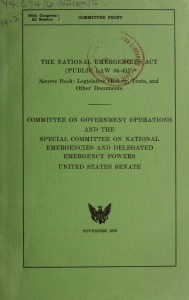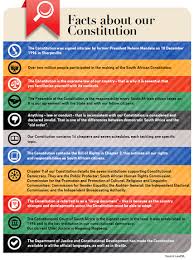What do you consider an emergency? Probably a car or sports accident that causes serious injury. Maybe a friend is worrisomely depressed. Or your parents face a financial crisis. Countries experience emergencies, too, such as tsunamis and military attacks on the homeland like the one that occurred in the United States on September 11, 2001.
 Fault Lines in the Constitution deals with two possible national emergencies—a foreign war and a pandemic. Both of these, by themselves, could cause in terrible consequences, including many deaths. The situations can become even worse because of problems in our Constitution. As we explain in the book, Americans are at risk of losing their freedom of speech during wartime and could be quarantined or jailed without reason during a widespread medical catastrophe. That’s because, unlike the constitutions of many other countries, ours says very little about limiting the powers of the president or protecting citizens’ rights during such times. And, Congress has filled the vacuum with laws that enhance the former and curtail the latter.
Fault Lines in the Constitution deals with two possible national emergencies—a foreign war and a pandemic. Both of these, by themselves, could cause in terrible consequences, including many deaths. The situations can become even worse because of problems in our Constitution. As we explain in the book, Americans are at risk of losing their freedom of speech during wartime and could be quarantined or jailed without reason during a widespread medical catastrophe. That’s because, unlike the constitutions of many other countries, ours says very little about limiting the powers of the president or protecting citizens’ rights during such times. And, Congress has filled the vacuum with laws that enhance the former and curtail the latter.
There are certainly circumstances when presidents should use their authority. During a time of real crisis, Congress might not be able to act fast enough—or even convene—to issue a proclamation of war, say, or vote for funds for a particular action to protect the country. We would want a leader to take charge quickly. Problems arise, however, in determining
- what is an emergency
- how long it lasts
- what the president can do, and
- whether courts can step in.
What is an Emergency?
The short answer to this question is that the president can declare almost any situation an emergency. The only dire circumstances mentioned in the Constitution are “Rebellion or Invasion.” These days, there are so many other possible disasters.
You might have heard President Donald J. Trump use the term “emergency” to describe undocumented immigrants and asylum-seekers who are trying to enter the United States from Mexico. Politicians and immigration experts disagree on whether these border crossings threaten our country but their views don’t matter. The president apparently gets to decide what counts. In fact, presidents are entitled to define it however they want and have seen emergencies in many situations.
Here are a few other examples from the past:
- During the Great Depression in 1933, President Franklin D. Roosevelt called the country’s economic crisis an emergency and closed the banks. The New York Times reported that he had acted like a dictator.
- After North Korea invaded South Korea in 1950, President Harry S. Truman declared and emergency and sent US troops.
- The Iran hostage crisis led President Jimmy Carter to bar Iranian goods and products from entering the US in 1979.
How Long Does an Emergency Last?
There’s a quick answer to this question, too: indefinitely. A total of thirty-one emergencies remain on the books because they’ve not been officially ended. The oldest one dates back to Carter’s in 1979.
 To try to get a handle on the situation, Congress passed the National Emergencies Act in 1976, which required the president to request Congress to renew a state of emergency every year. This law has failed because Congress has not implemented it. Presidents rarely request renewal; congresspeople rarely demand it; and the so-called emergency lingers.
To try to get a handle on the situation, Congress passed the National Emergencies Act in 1976, which required the president to request Congress to renew a state of emergency every year. This law has failed because Congress has not implemented it. Presidents rarely request renewal; congresspeople rarely demand it; and the so-called emergency lingers.
What Can Presidents Do?
Once a president declares an emergency, an alternate legal universe blossoms in which they can sidestep many laws and personal rights that are normally in effect. For instance, if Trump officially declared an emergency, he might be able to
- divert funds intended for the military;
- seize private property through eminent domain, paying the owners whatever amount the government thinks the land is worth; and
- command troops to build a wall along the border.
In addition to the actions we’ve mentioned, various acts of Congress allow presidents to
- “Organize and control the means of production.”—This could allow the federal government to take over private businesses, such as arms manufacturers, pharmacies, and farms and distribute or ration guns, drugs, food, and other products.
- “Assign military forces abroad.”—In other words, go to war.
- “Seize and control all transportation and communication”—The government could commandeer planes, trains, ships, cell towers, and the internet.
This is just a small sampling of possibilities. A Senate report concluded that the president could “control the lives of all American citizens.” As far back as Franklin Roosevelt’s administration, Senator Frank Church of Idaho said these powers “were like a loaded gun lying around the house, ready to be fired by any trigger-happy president who might come around.”
Can the Courts Step In?
If someone, such as a property-owner, sued, courts could decide whether a true emergency existed and whether the president’s actions are justified. However, the Supreme Court has rarely done so. Two years after Truman declared a state of emergency, in 1950, he also tried to take over the steel industry, but the Supreme Court ruled that he couldn’t. Since it’s not easy stop a president, it’s critical that they be trustworthy in using their powers.
Is There Any Recourse?!

The only people who can restrain a president from going overboard in declaring an emergency are our representatives and senators in Congress. If a majority of each house votes against an emergency, the president’s powers are stopped in their tracks—until the president vetoes Congress. In that case, two-thirds of each house—that is, 290 representatives and 67 senators—must join forces to overrule the veto.
An alternative solution is to look at other countries. The constitutions of almost 180 countries address emergency powers. In Fault Lines in the Constitution we provide an example from South Africa. Check it out.

Conveniently, this particular emergency falls into one of those two categories of dire circumstances: It’s an “invasion”.
If these people were merely walking up to the border and *asking* to enter, it wouldn’t be. But they’re not asking if they can avoid it, and they’re not taking “no” for an answer if they get it, and that makes what they’re doing an “invasion”, without the least bit of sophistry required.
Most declarations of emergency under the Emergency act are constitutionally suspect, this one is as sound as it gets.
I do, however, agree that the Emergency act itself is dubious from a constitutional standpoint. And your “various acts” are constitutional abominations.
But Trump’s action here is still soundly grounded in statutory authority given Presidents by Congress, and he hasn’t even yet proposed to do something that can be seriously argued to be beyond federal power under the Constitution.
LikeLike
Brett, we always appreciate seeing your perspective. It’s important for us and our readers.
LikeLiked by 1 person
I sincerely hope that every middle school student in America is exposed to this great book.
LikeLiked by 1 person
Thank you, Nisan! So, do we.
LikeLike